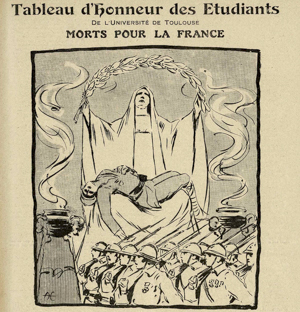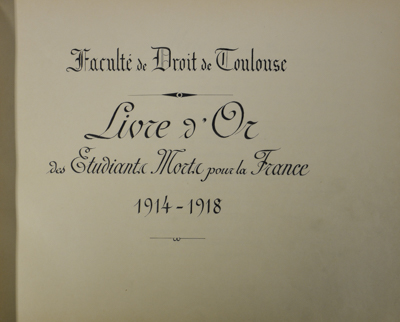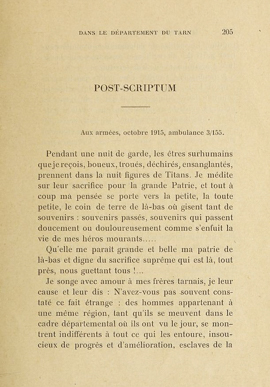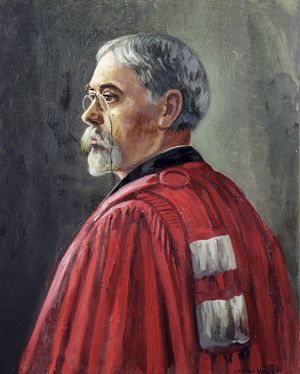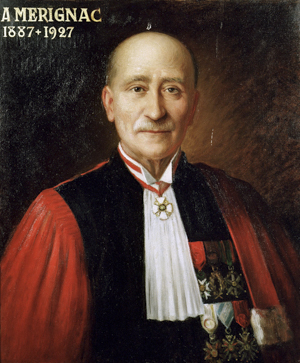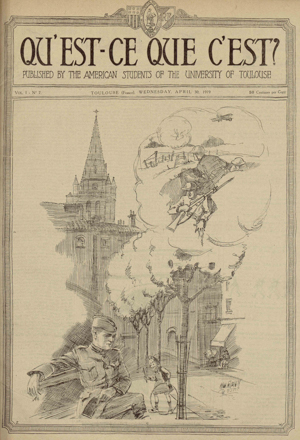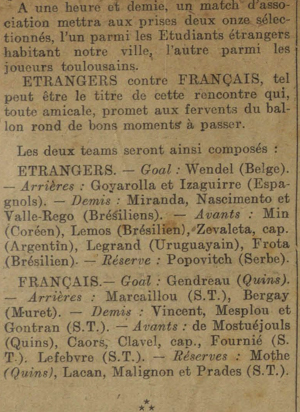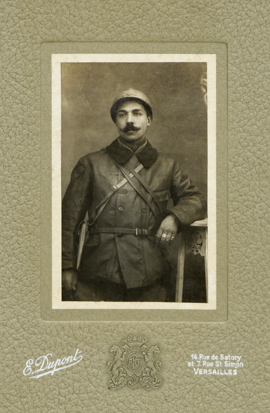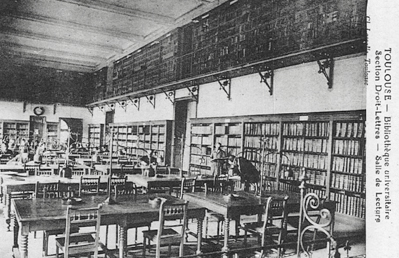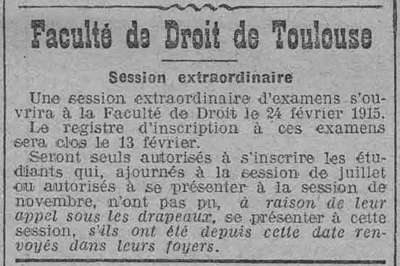“Et puis honneur à nos grands morts qui nous ont fait cette victoire ! [And honored be our great dead, who made this victory for us!]” Georges Clemenceau, Chamber of Deputies, November 11, 1918 Men live. They also die, sometimes very young and before their time. Memento mori ! Remember death, the old societies repeated. Our old masters liked to quote Latin – the authorities and philosophers of our Antiquity. Death is inevitable, but seems far ahead of us. But in the heat of August 1914, once war was declared, death did not prowl. It was present, everywhere, often, for those who had gone to the borders to defend the country. As provided for by the provisions of the General Staff since the spring of 1914, Plan XVIIpour lire la suite…
Tag: Toulouse
Institutional memory : the Livre d’Or of the Toulouse Faculty of Law
From the very beginning of a war that was quickly imagined victorious, the loss of life proved to be immense and, to keep the accounts up to date, no one waited for the law of October 25, 1919 “relative à la commémoration et à la glorification des morts pour la France au cours de la Grande Guerre [relating to the commemoration and glorification of those who have died for France during the Great War]” providing for the constitution of a Livre d’Or, which was to list the names of the sons of each commune who took part in the conflict. For financial reasons, the planned 120 volumes would not see the light of day. Like many other institutions, the Toulouse Faculty of Law quickly tookpour lire la suite…
The doctoral theses of the Toulouse Faculty of Law in the face of war
A break in doctoral practices The first effect of the war on the production of theses at the Toulouse Faculty of Law was first observed in the number of theses defended, which decreased drastically in 1914. The pre-war years saw regular defenses for thirty to forty theses, and even though the year 1911, with its 50 theses, marked the beginning of a decline (due both to a change in the conditions for awarding the doctorate in Toulouse in 1911 and a general decline in the number of students in all the faculties of the south affected by competition from Limoges and Clermont-Ferrand from 1909), the two years before the war still saw 34 and 25 doctoral defenses respectively. But a total collapse occurred from the beginning of the war : only one thesispour lire la suite…
Dean Maurice Hauriou’s speeches (1914-1919)
On Saturday, July 18, 1914, twenty days after the assassination of Archduke Franz Ferdinand, the academic year ended at the Toulouse Faculty of Law. In the middle of the afternoon, the faculty board was presided by Dean Maurice Hauriou (1856-1929). Over thirty minutes, they debated the candidacies for the vacant chair of Roman law as well as the distribution of the proceeds of the optional lectures. The faculty assembly then met to award the prizes of the end-of-year exams, the regulation of free courses and the Maurice Garrigou Foundation. Students and teachers were still able to enjoy a few peaceful days before being swept away by the turmoil of war. On Wednesday, November 25, 1914, the European conflict became a part of the debates of the organs of thepour lire la suite…
Alexandre Mérignhac (1857-1927), a voice for international peace
Officer of the Légion d’Honneur, Officer of Public Instruction, Knight of Agricultural Merit, Commander of the Order of Isabella the Catholic, Knight of the Crown of Italy ; the decorations are many but the eyes seem melancholic. Alexandre Mérignhac, a forgotten figure, offers a contrasting image. In his time honored both nationally and internationally, he has experienced many disappointments in his constant fight, if not for a total eradication of war, at least in favor of its codification and the establishment of international peacekeeping bodies. Born in Toulouse on January 21, 1857, this son of a lawyer defended at the age of 20 his doctoral thesis devoted to the Law of resale by mortgage in Roman and French law, before becoming in turn a lawyer at thepour lire la suite…
American students at the Toulouse Faculty of Law
Shoulder Arms, Charlie Chaplin’s film, released in the United States on October 20, 1918, features Charlot trying to train in an army camp. When evening comes, he falls asleep and wakes up in a trench in France sharing the expectation and the idleness of his companions in misfortune. He volunteers for an espionage mission. Returning a hero, having saved a young French woman and captured Kaiser Wilhelm II, Marshal Hindenburg and the Kronprinz. Chaplin was no stranger to the poilus when his film was released in France on April 20, 1919 under the name Charlot Soldat. In 1915 at the Bois de la Vache in Somme, Swiss Frédéric Louis Sauser, alias Blaise Cendrars, while he was serving in the French army as a foreign volunteer,pour lire la suite…
Welcoming foreign students at the Toulouse Faculty of Law
To talk about this theme shows how the academic environment has changed in very few generations of students. How many generations was it by the way ? For the Toulouse Faculty of Law, the inflection point may be associated with a change in status, in power seat, in symbol. In 1971, the Toulouse Faculty of Law and Economics became the University of Social Sciences ; the last dean, Professor Marty, was the first president of the new entity ; the place of power shifted from the “old college” of regulars to the spaces perceived as sanitized by the “new university”, quickly decorated with the name inherited from the old military power that had inhabited it since the Revolution : the Arsenal. In the new academy, foreign students were nopour lire la suite…
Portraits of Toulouse students in the war
In Toulouse, the academic year of the first year of war began on November 9, 1914. It unfolded “normally”, Dean Maurice Hauriou reported to his assembled colleagues. And yet the numbers speak for themselves. After 1,032 enrollments in 1913, only 295 in 1914. By 1916, only 175 enrollments would be registered and, although the increase somewhat resumed later, it was not until 1930 that the threshold of a thousand new students would again be crossed. The Toulouse Faculty of Law of was hit hard by the outbreak of hostilities. While many had already joined their regiment or would gradually leave, those in the rear were expected to mobilize in their own way as well. For the deferred and exempted conscripts, though sometimes very temporarily, aspour lire la suite…
The humanities section of the University Library of Toulouse in the Great War
In an effort to raise the level of higher education in the country, and in view of the importance of libraries in achieving this goal, the Third Republic undertook, through an abundance of regulatory production, to organize university libraries. In Toulouse, these efforts resulted in the creation, in 1879, of a unified university library. But it was not until 1891 that the definitive organization was established with, to serve the four faculties, two geographically distinct sections : science and medicine in the alleys of Saint-Michel, and humanities, including law, on the premises of the law school, currently called “former faculties”. The humanities section soon became too cramped and moved in July 1910 to 56, rue du Taur, on the premises of the former great seminary ofpour lire la suite…
The Toulouse Faculty of Law in the war
On June 9, 1929, on the occasion of the commemoration of the 700th anniversary of the creation of the University of Toulouse, law historian Joseph Declareuil (1863-1938) recounted the history of the institution. He mentioned “twenty generations of masters and students who successively appeared, thought, acted, fought to acquire knowledge, then vanished under the veil of the fleeting time” and proposed to “draw some lessons from this great past”. Unwinding the thread of the long history of the Studium Tolosanum, he focused little on the law school during the late 19th and early 20th centuries. He quickly alludes to new chairs and courses, the creation of institutes, relations with practical law and notarial schools, and the reformation of the University of Toulouse in 1906. He,pour lire la suite…

